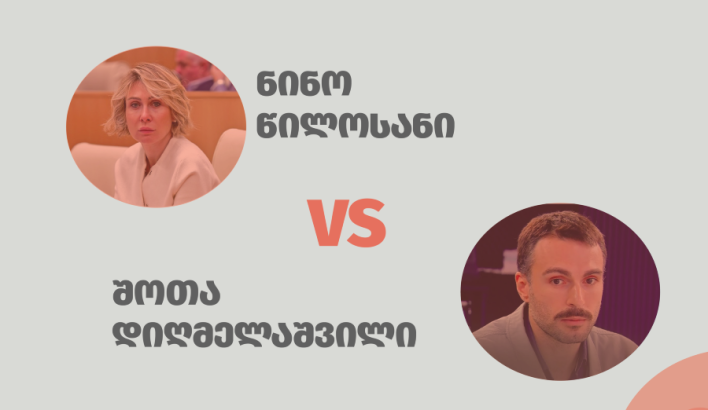
On April 29, 2022, Zaal Maruashvili, Tbilisi City Court Civil Cases Collegiate Judge, announced the decision on the case of Nino Tsilosani v. Shota Dighmelashvili. The court satisfied Tsilosani's claim and found that defamation had occurred against her.
The case concerns a lawsuit filed in court by Nino Tsilosani, a member of the Parliament of Georgia, disputing the statements made by civil rights activist Shota Digmelashvili in the summer of 2019. The civil rights activist told the broadcast "Shame" during live transmission that the MP was acting as the so called “Krisha” (patronage) for Sano LLC. Tsilosani argued that by disseminating such information, her honor and dignity were violated and demanded retraction of these statements.
At the court, Shota Digmelashvili argued that while making these statements, he was acting as a journalist and he shared information he got from publicly available sources about the Georgian Dream MP's connection to Sano LLC. According to the State Audit Office data, the company received approximately GEL 2 million unjustifiable additional income from the budget allocated to the homeless in Kutaisi. The defendant explained that the findings he voiced relied solely on information available in public sources. He emphasized the fact that Nino Tsilosani is a high-ranking government official with a greater obligation to tolerate nuisances.
Regrettably, the court ignored the European Court and the national court case law. It did not consider the dangers posed by adopting such a punitive course. The judge agreed with the plaintiff, noting that for an objective observer, the disputed statement would be perceived as a statement of fact, and hence, defamed Tsilosani’s honor and dignity.
Critical statements made by journalists have repeatedly been the basis for litigation, and the authorities are especially proactive. This trend is an abuse of the legal mechanism and is aimed at silencing journalists/media and illegal restriction of the freedom of speech and expression (the so-called SLAPP/intimidation lawsuits). Given the tendency of government officials to file unfounded lawsuits, the above decision creates an exceptionally treacherous precedent. It creates an expectation that public officials will increasingly turn the freedom of speech and expression into the objects of the litigation.
Mr. Digmelashvili is represented by the GDI. The GDI provides legal support on media freedom issues, including in this case, in partnership with the European Endowment for Democracy (EED) within the framework of the project: "Protection of media freedom by improving media regulations in law, administrative practice and case law".
